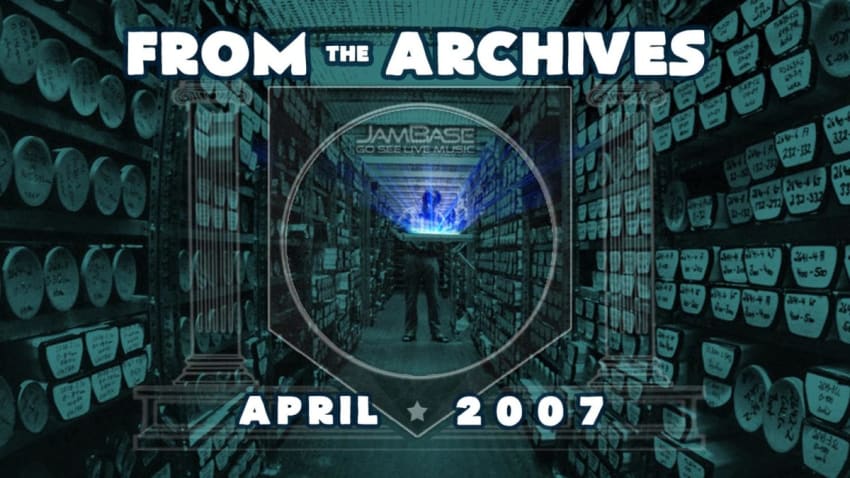RJD2: GOT TO DO WHAT YOU GOT TO DO
By Team JamBase Apr 17, 2007 • 12:00 am PDT

By: Chris Pacifico
 |
The Third Hand diverges into nouvelle vague terrain that has RJD2 playing all the instruments and even singing. Some have heralded it for having the adroitness of a singer/songwriter while others call it a pop itch that needed to be scratched. Regardless of what your take is The Third Hand shines with bubbly grooves, space pimp shimmies and an icy pop knack for miasmic melodies. Now touring with a full band, RJD2 joins JamBase for a tête-à-tête about his new creative direction, jumping ship from his longtime record label and how he remains like Teflon in the face of negative reviews.
JamBase: The Third Hand has an obvious pop friendly angle to it.
 RJD2: It kind of just happened, if that makes any sense. I’ve always had an interest in trying to do all kinds of records, be they instrumental, vocal, pop, ambient, whatever. So, I guess in that sense it’s just another stop on the train. I don’t think that the new one is completely out of the blue.
RJD2: It kind of just happened, if that makes any sense. I’ve always had an interest in trying to do all kinds of records, be they instrumental, vocal, pop, ambient, whatever. So, I guess in that sense it’s just another stop on the train. I don’t think that the new one is completely out of the blue.
JamBase: Would you say that Since We Last Spoke (RJD2’s 2004 studio release) was in any way a segue into the vibe of this new album?
RJD2: To put it that way would be for me to say that this is kind of the destination point for any particular progression, which I don’t particularly agree with. I feel they are all just like stopping points.
Would you say that you went thorough any sort of rebirth or do you just see it as a form of creative evolution?
 |
When you were in the process of making the record were you aware that there might be some longtime fans that could be like “Whoa! What is this?”
Oh yeah. It’s not something I’m thrilled about but at the same time you got to do what you got to do.
Were any of these tracks road tested before the release?
Oh no, I didn’t have the band with me during that time and it’s really the only way that I can do those songs. It would’ve been really hard to do these by myself.
How long did it take you to record it?
I recorded it at my home and it took me about a year and a half.
Listening to it all the way through one can tell these tracks have been most aptly sequenced. Is that something you saw as a big part of giving it that album feel?
I worked a long time on that. There are a few little bridges, intros and outros I placed on the record that hopefully give it the feel of being a cohesive project.
What’s the origin of the new album’s title?
 |
How would you say that the crowd reception has been touring this album?
I feel like it’s been good. Sometimes people are initially a little bit like, “I didn’t know what to expect,” but overall I feel it’s been good.
When I was in Austin at South by Southwest last month some of my fellow writers and colleagues were wondering why you played the Pitchfork party after they had trashed your album.
Well, it was set up beforehand and already organized. I didn’t read the review, which came out a couple of days before the festival. I’m not in any sort of buddy-buddy world, and I felt it would’ve been tactless to let it get to me. At the end of the day, it’s just a review and I don’t think that [Pitchfork] is any more or less important that any other journalism outlet.
What was behind your move from Def Jux to XL? Was it an amicable split?
 |
At what point in your life did you decide that you wanted to start making beats and music and sampling and whatnot?
It was when I was younger, after I’d been DJ’ing for a while. I kind of fell into the DJ’ing thing and that sort of led to my being fascinated by how the records that I was playing were made, and that led to getting into producing and stuff.
Throughout all of your albums I’ve really noticed a cinematic vibe. Would you say that film influenced your music in any way?
Yeah, definitely. I’m really into film scores. I’m an Ennio Morricone fan, and I really like the stuff that Giorgio Moroder did for Battlestar Galactica and Scarface.
Looking down the road, do you have anything lined up as far as side projects, collaborations or anything of the sort?
I’ve got a couple of things that I’d like to do but I don’t talk about things until they’re definite. I’m not going to say that I’m going to do something until I’ve already done it.
JamBase | Worldwide
Go See Live Music!
